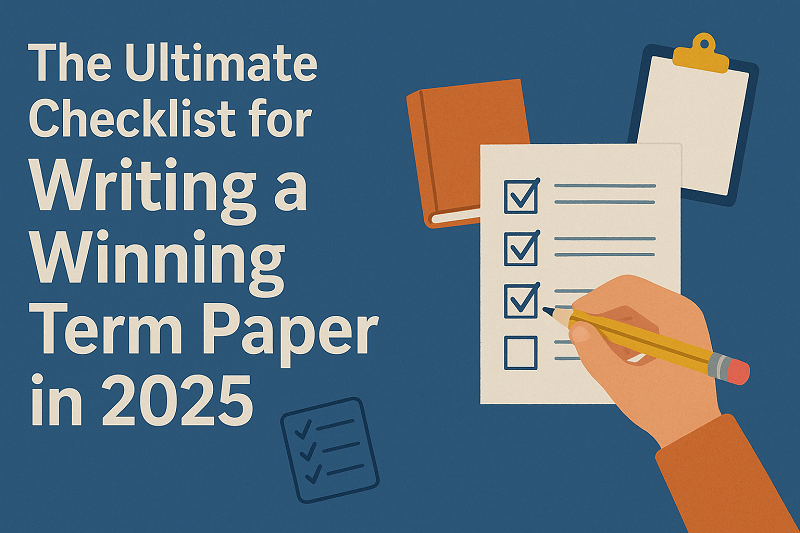Thinking simply putting words on paper is enough to earn good grades? No! Writing a term paper in 2025 requires you to think analytically while keeping originality and academic integrity. Students often have to face these challenges: tight deadlines, the pressure of meeting professors’ high expectations, following formatting rules, and maintaining clarity of thought. In these situations, a crucial ally is term paper writing checklists that help students turn chaos into structure.
Keep reading this blog to get a roadmap on how to produce term papers with confidence.
Building a Strong Foundation with Term Paper Writing Checklists
Starting with writing is not a professional approach to producing a well-structured paper. Instead, a term paper requires you to plan everything, from introduction to conclusion. It’s essential to pause and consider your foundation right before you open a new document. Having a checklist means that you’re able to think critically about every stage, from topic selection to final proofreading and editing. This checklist helps you manage valuable time and avoid getting stressed.
At first, you define the objective, helping the reader to learn or feel. Right after that, as your topic needs to be specific and researchable, you need to narrow the topic. Now, it’s the time to collect authentic scholarly sources, including relevant textbooks, peer-reviewed journals, and research databases. Authentic sources play a noticeable role in making your argument influential.
Your research needs to be well-balanced with reflection, and it’s the key point in using term paper writing checklists. The readers shouldn’t feel your paper is just a collection of citations. Instead, your term paper requires you to present your own interpretation of credible sources. You can ensure academic weight and personal authenticity for the paper through a perfect mishmash of logic and individuality.
Research with Intention
Research can either strengthen your work or drown you in the information sea. That’s why intention is essential while doing research, one of the main parts of learning how to write a term paper. Simply piling references is not a wise approach. Instead, you need to approach it with purpose. Everything needs to be aligned with your argument, and you can make sure this by observing patterns, finding recurring theories, and recording the concrete evidence.
Most students are still regurgitating what’s been published. Remember that academic writing in 2025 requires more than this approach. Modern-day professors expect critical engagement, which refers to the capability of questioning theoretical assumptions and analyzing data from multiple viewpoints. When it comes to gathering scholarly sources, you need to ensure that information you’re gathering deepens your understanding, not just fills space.
In academic writing, citations and paraphrasing help you win the game, meaning that you need to follow exactly what citation style you’re required to use, like APA, MLA, Chicago, and others. Tracking page numbers and authors is easier by keeping a separate notes section, helping you save valuable time when formatting citations and minimize the accidental plagiarism offense.
Crafting a Compelling Thesis
Your term paper’s core is your thesis. A thesis refers to the statement through which you convey to readers what your argument is and tell them what it truly stands for. If you just summarize your topic, it’s not enough. Taking a clear stance for your topic is a “must” because you can just deteriorate your entire effort through a vague thesis. With a strong one, you drive every section of the paper that follows.
What makes a thesis statement strong? Answer: a strong one needs to be specific, arguable, and brief. For instance, avoid writing “Social media platforms affect education.” Instead, write, “Social media platforms have remodeled academic engagement by having impacts on attention spans and study practices among students.” This is a precise statement that helps students create the right direction and purpose.
Most of the time, forming a thesis becomes a challenge and feels overwhelming, compelling even intelligent learners to turn towards the best online essay writing services. However, if you face it, it’s advisable to either hire a trusted service or DIY. For the second approach, outline your arguments first. Over and over again, a central idea of the term paper naturally appears from the evidence collected earlier. Afterwards, improve it until it becomes intellectually clear and emotionally substantive.
Structuring the Argument Logically
Like style, good writing is also strongly based on structure. So, make every paragraph meaningful, from the first paragraph of your introduction to the middle argument and evidence to the last mini-conclusion. When everything comes together with style and structure, a logical rhythm is formed that keeps readers motivated to read the entire paper.
You welcome the reader through a persuasive introduction, persuade them through a body, and reinforce everything through a concise conclusion. It is recommended to avoid repeating ideas because this approach makes the reader frustrated. Likewise, you don’t need to let your sections wander off-topic. Your thoughts need to be connected smoothly, and you can do it by using transitions to connect them. Ultimately, readers are guided through your reasoning.
Although the structure is your focal point to make your writing good, incorporate professional term paper writing tips learned from professors. Outlining before writing or starting with topic sentences might be simple advice you have from a professional, but you can prevent countless revisions later with this approach.
Balancing Data and Analysis
Many students strongly need to learn how to write a term paper because they often let data do the talking without relevant analysis, which is the more common mistake. Not only just what you found, but professors expect you to know what and how you think about your findings.
So, once you introduce a piece of evidence, like a study or a quote, you need to follow it with proper interpretation and critical analysis. In doing so, you need to explain the significance and how your thesis is supported by that. This is what enables you to separate superficial writing from in-depth research that influences.
Additionally, as artificial intelligence (AI) tools become common for all fields, academic spaces are no exception. These tools greatly influence human insight, making it the unique factor of an influential term paper. However, authentic analysis is still essential, which can be done by yourself.
Practical Term Paper Writing Tips That Still Work
Some strong academic writing principles remain timeless, although advanced technologies, like AI tools, and updated formats become common. Long sentences don’t make sense; break them into small chunks and make them digestible. Using active voice is also essential in academic writing, and use it whenever clarity allows. It’s also essential to keep paragraphs balanced, meaning that your sentences must not be too concise or too long because they may lack substance and lose focus.
Understanding your audience is another timeless principle of good term paper writing. A psychology paper requires a different writing approach than a literature one. So, it’s essential to adjust tone, style, terminology, and examples for that reason.
Keep in mind that sounding overly complex goal is a mistake; your goal needs to be credible. Avoid vocabulary-heavy prose. Clarity is everything because you can persuade readers well with this. Following these term paper writing tips can ensure that you’re on the right track.
Staying Organized and Managing Time
Disciplined time management is key to success, and a good term paper reflects it. Your term paper project needs to be broken into smaller, achievable pieces. For this, specific hours need to be dedicated to in-depth research, outlining the draft, writing the paper, and proofreading and editing it. Good planning helps students finish peacefully, and those who rush lose accuracy.
You can manage your work competently. How? You need to make calendar-based goals and learn how to write a term paper based on them. For instance, you can set a few days or a week for getting your topic approved, the second week for research, the third one for outlining the draft, the fourth one for writing the introduction, and the last one for possible revisions. Building consistent progress is essential, and proper time management can help you eliminate panic.
Students are well aware of online citation makers, grammar checkers, plagiarism sensors, and other modern tools that help them streamline the process. These tools strengthen accuracy without affecting originality; you can use them wisely.
Despite anything discussed earlier, students often need additional help from professionals. Exploring custom term paper writing services online can be a practical solution for those students. Hiring a reliable service means you can get templates, support for editing, and even complete backing under strict academic guidelines. Credible platforms don’t steal your intellectuality, but they ensure your knowledge-gaining process remains ethical and valuable.
Conclusion
Now, you’re aware of the fact that your checklist builds your confidence. Proper structure, thorough research, and good discipline have strong potential to make your term papers a winning tool for your higher education degree. With a dependable term paper writing checklist approach, you can convince your professor and build trust in your own method. You’ll find that once you become well aware of how these writing checklists or processes work, from outlining the draft to writing and final proofreading, anxiety disappears, and precision takes its place.



